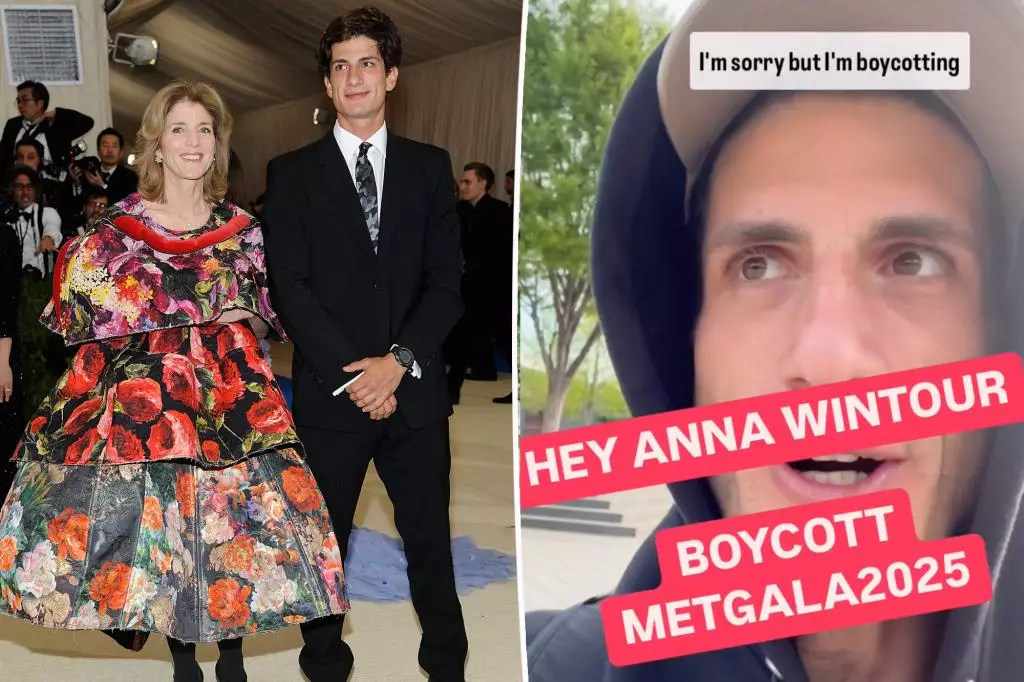Jack Schlossberg, the grandson of President John F. Kennedy and the son of Caroline Kennedy, is not just a name attached to a legendary family; he is emerging as a figure in his own right. This new image comes with its own set of expectations and pressures, amplifying his voice in matters that resonate far beyond the silver spoon he was born with. Recently, Schlossberg has taken to social media to announce his self-imposed boycott of this year’s Met Gala, a move that has been met with skepticism by insiders who note he was not even on the guest list. The response from the fashion community and general public will tell us much about how his actions resonate within today’s cultural and social landscapes.
The Met Gala: A Celebration or a Statement?
Deciphering the essence of the Met Gala is crucial in understanding Schlossberg’s position. Marketed as the “Oscars of Fashion,” this star-studded event transcends mere glitz and glamour; it serves as a fundraiser for the Costume Institute of the Metropolitan Museum of Art. Each attendee is indirectly representing a brand that has chosen to sponsor their seat, adding layers of complexity to questions of who gets to attend and why. Schlossberg’s choice to skip the event is a statement—a commentary on the values projected by fashion institutions, particularly when viewed through the lens of social issues, a sentiment he articulates in his posts.
Yet, the authenticity of this boycott is marred by questions regarding its sincerity. Schlossberg claims he will not attend due to pressing global issues—an honorable reason, yet the underlying motivation is questionable given his lack of an official invitation. His social media presence beams with irony as he navigates the complexities of celebrity and privilege, suggesting that his voice carries a weight only because of his storied lineage. If Schlossberg hopes to affect change, does he risk coming off as a mere provocateur in a high-fashion light?
Media Strategy or Genuine Concern?
Schlossberg’s comments regarding the silence of high-profile fashion publications like Vogue raise important questions about their role as cultural arbiters. His critique of Vogue is striking—he argues that they should leverage their platform to engage with crucial societal issues rather than get bogged down by corporate politics. However, one must wonder if this is genuine concern or simply a way for him to gain traction for his upcoming media project, as suggested in his posts.
There is something disconcerting about his timing and tactics; using a boycott to promote personal endeavors may dilute the authenticity of his message. While Schlossberg is undoubtedly hitting on themes that matter—such as the intersection of art, culture, and politics—his execution seems reminiscent of a calculated publicity stunt rather than a heartfelt call to action. The result is a scenario that risks diluting the very topics he aims to elevate.
Culture Clash On the Horizon
While Schlossberg’s concerns about the fashion industry’s ethical responsibilities are valid, they prompt a broader consideration of how culture intersects with capitalism. The Met Gala isn’t just a party; it’s a microcosm of a larger cultural landscape where art meets commerce. Schlossberg’s grievances may resonate with some, conjuring images of an elitist event detached from pressing realities globally. Yet, it also opens up discussions about whether boycotting this platform truly transforms or simply perpetuates a cycle of exclusion.
Diversity in attendance—coupled with celebrity figures like Lizzo and Shakira—paints a nuanced picture of a fashion event grappling with its historic ties to privilege and exclusivity. Schlossberg could have chosen a different path by utilizing his platform to engage in meaningful conversations or alternative celebrations rather than issuing a self-imposed ban. Perhaps a seat at the table, provided through connection and dialogue rather than protest, could enable a more significant impact than a boycott on social media that reads like mere noise.
Navigating Legacy and Innovation
Ultimately, Jack Schlossberg stands at a crossroads. He bears the weight of a remarkable legacy while simultaneously advocating for meaningful change in a world where fashion is increasingly intersecting with political dialogue. His actions have the potential to ignite conversation, yet effectiveness hinges on substance over spectacle. Canceling oneself from an event like the Met Gala may denote a rebellion against established norms, but the real challenge lies in transforming that discourse into actionable change. How he chooses to channel his influence will determine whether his actions will mark the beginning of a more conscious dialogue surrounding fashion’s role in society or fade into the background noise of its extravagance.

